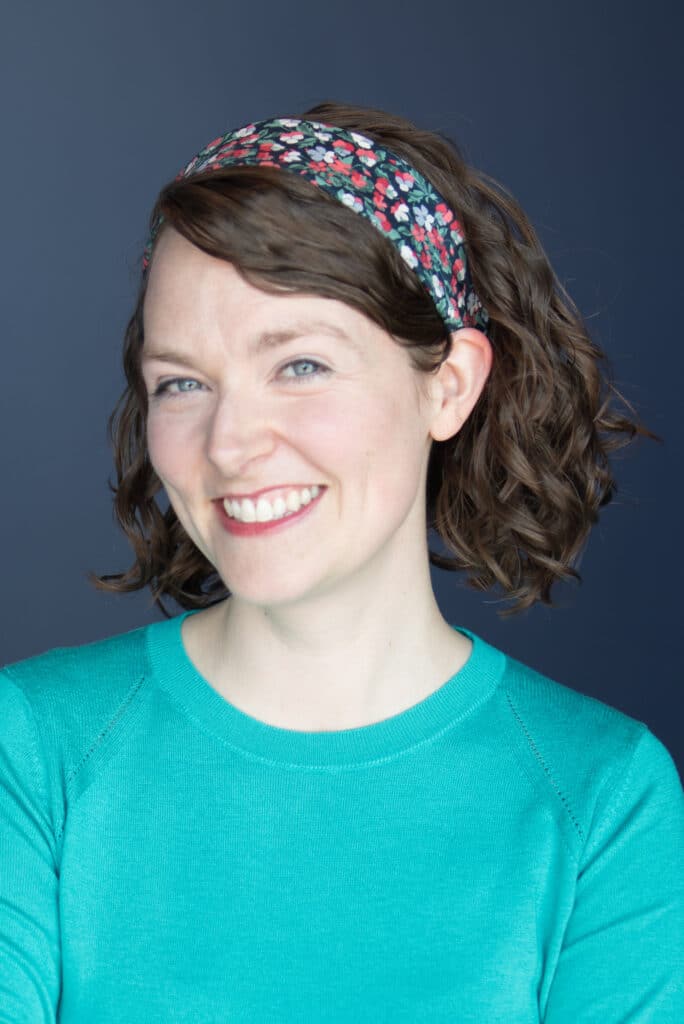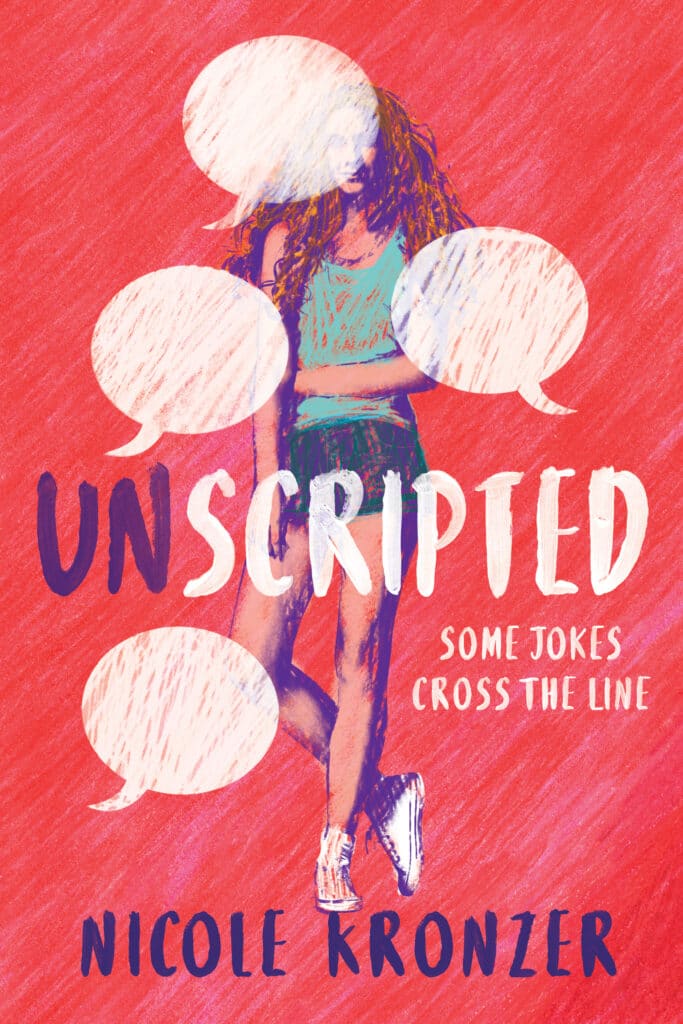Nicole Kronzer, author of Unscripted
Young Adult Literature category, sponsored by United Educators Credit Union
Each week leading up to the 33rd annual Minnesota Book Awards announcement, we are featuring exclusive interviews with our 36 finalists. You can also watch the authors in conversation with their fellow category finalists here.
In a year defined by a pandemic and its fallout, virtually everything about our lives has changed in some way. How has COVID-19 impacted your writing habits and preferences? Has the unique zeitgeist of the past year influenced your writing output in any ways that you can pinpoint?

Writing has always been an escape from the real world for me. Perhaps because I’m a little bit (or maybe a lot of bit) of a perfectionist/control freak, being entirely in charge of the world I create keeps those controlling tendencies from exploding out sideways in my real life. (I think. I hope. Maybe ask my family…) Therefore, in a world that felt so out of control this year, I came back to the writing to center me even more than usual.
Would you tell us one or two things about your finalist book that you are particularly proud of, and why? (Sure, it may feel a bit un-Minnesotan to say so, but it’s not boasting if we ask!)
Unscripted is my debut novel, but it was the second novel I wrote. I tried to get an agent with the first one, but while I received some lovely passes, I was ultimately unsuccessful. I’m proud that I tried again, but I know that part of what kept me going was my students. High schoolers are so wonderful and vulnerable and brave. I knew if I was going to ask them to dig deep and try their hardest in my English class, there was no way I could also stand in front of them and say writing was too hard and I was quitting. Sometimes we do things for ourselves for other people, and this was kind of that. I’m so glad I stuck with it.
I’m also really proud of the audiobook. When we sold the audiobook rights, I knew every single person in my life who knew I used to be a professional actor was going to ask me if I was going to narrate it. So even though I’d never performed an audiobook before (unless you count reading all seven Harry Potter books out loud to my daughters), I decided to at least ask if I could audition. I was delighted when the audiobook company agreed to let me. I happened to be visiting my agency in New York when the news came in that I’d booked the gig, so it was so much fun to be able to celebrate with them! Best of all, we recorded it here in town at Audio Ruckus the last week of February in 2020—just before the pandemic hit. Alison McGhee, fellow category finalist and agency sibling, gave me wonderful audiobook advice going into the experience, and I know the performance is all the stronger thanks to her.

What do you hope that your audience learns or takes away from your book?
“Girls are funny” shouldn’t still be a thing we’re debating. I offer up fellow category finalist Laura Zimmermann’s book as case in point. But apparently it is. So hot take: girls are funny.
But another reason I wrote this book was in response to the number of students coming to me about their terrible boyfriends and me going, “Um. So that’s an emotionally abusive relationship…” and them insisting, “No no no no. He just doesn’t like it when I hang out with my friends. And he yells a lot. But then he’s really sorry, and it’s so good again.”
Dr. Rudine Sims Bishop talks about books being “windows, mirrors, and sliding glass doors.” I hope this book can serve as a mirror for someone in the midst of an emotionally abusive relationship. That they can recognize themselves in Zelda and see the reality of their own situation and either ask for or accept help to get out of it. I was definitely thinking about victims of emotional abuse recognizing themselves as I wrote, but if a person could recognize themselves in Ben, the perpetrator, and realize they need to get help—holy cow. Yes, please. I also hope the book serves as a window for other readers to see the red flags of emotional abuse so they can shut those situations down altogether. Not too long ago, a teenager messaged me on Instagram and said reading my book made her realize “who deserves me and who doesn’t.” That’s a pretty boss takeaway.
Minnesota enjoys a reputation as a place that values literature and reading. If this sentiment rings true for you, what about our home state makes it such a welcoming and conductive place for writers?
I think it has a lot to do with Minnesota’s can-do spirit. Jennifer Dodgson at the Literary Loft in Minneapolis was the first person I admitted to as an adult that I thought I had “a young adult book inside me.” She looked at me all clear-eyed and no-nonsense and said, “Write it. Write it!” I’ve said this other places, but even into adulthood, I really believed authors were mythical and unicorn-like, and as I was neither of those things, I didn’t get to write books. But once I started sort of declaring myself out loud, other local writers came running toward me with shouts of, “We’re here! We’re real people! Just give it a try!” Also, “It’s so cold here! What else are you going to do?”
What advice would you give to an aspiring writer with an interest in your category?
Read a lot of YA. Read widely both in and outside of your particular sub-genre. If you’re lucky enough to have teenagers in your life, let them read what you’re writing. Ask for their feedback. Also, find people who are at the same point in their writing journey as you. I would have quit a thousand times without my critique partner, Kristi Romo.
Tell us something about yourself that is not widely known! (It doesn’t have to be about your writing.)
The thing about being a loud extrovert is basically everything inside my head has been said outside my head at some point, but here we go! Maybe one thing I haven’t shouted super loudly about yet is my love of domestic history. I stare at a two hundred-year-old door knob and imagine the people’s hands that have turned it. How their lives were just like and so different from mine. I love a saggy stone step—the effect of generations and generations of footfalls. Twenty years ago, I saw safety pins that survived the Globe Theatre fire in London in the early 1600s. They lay behind glass in a museum: such small, simple things. But also so very human and relatable. Witnessing their existence felt like time travel.
It’s my love for domestic history and the interconnectedness of humanity that inspired my next YA book, The Roof Over Our Heads. It’s about a contemporary family comprised of theatre people who caretake a historical home (the floor plan of which I shamelessly stole from the James J. Hill House in St. Paul), and the bananas play/escape room/murder mystery/art heist they devise to save it from being sold to developers. I love love loved doing the research for this book. Holding 19th century handwritten recipes and love letters and postcards in my hands, knowing 19th century hands had held them, too, brought tears to my eyes more than once. Shout out to Craig Johnson as well as the absolute treasure trove we have in the Minnesota Historical Society! They’re all so passionate and smart and thoughtful, and I love being a member.
Nicole Kronzer is a former professional actor and improvisor who now teaches English and creative writing. This is her first book.

